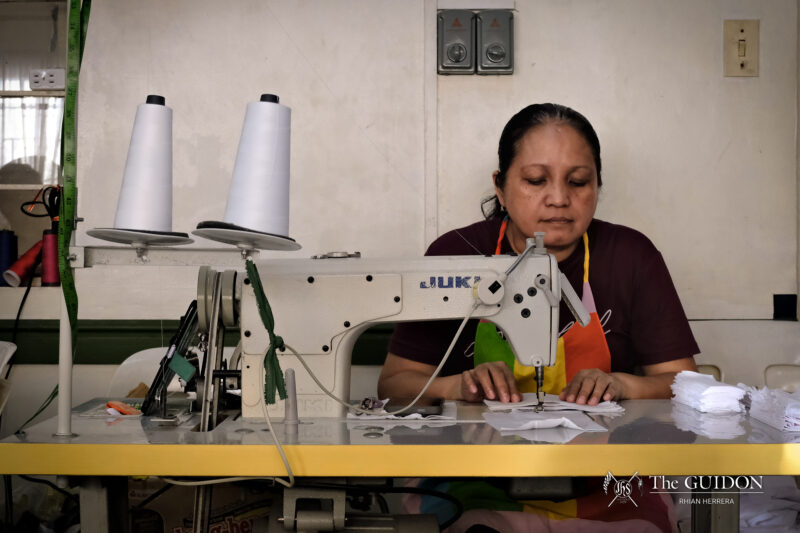To Cadence*, going home wasn’t something she looked forward to at the end of a school day. Constant bickering between her parents, put-downs from her mother, and hatred towards her father were not exactly matters she liked facing. Her repressed anger towards her family life would consume her to the point of self-inflicted wounds and rebellious acts, but not once did she think she needed help.
Such is the case for most students with problems they’re not willing to confront. Calling for an expert’s help is abnormal in collectivist countries like the Philippines, as culture dictates that one must not stand out from the rest, or exaggerate “unnecessary” problems.
For Ateneans most especially, the thought of psychological therapy comes with a stigma, making it an unwelcome and unpopular idea; students are usually scared of being labeled as “problematic” or “unbalanced.” Counseling isn’t as ubiquitous here as it is in say, a Western setting; everyone wants to be “just fine,” but unfortunately, this isn’t always the case, and ignoring the problem makes it even worse.
Effective counseling
Students usually ignore feelings of elevated sadness and distress, which may result in self-destructive measures. Cadence, for one, didn’t understand how serious it actually was in her situation. “I felt very little self-worth, but I really didn’t think I had a problem,” she recalls. Her parents finally realized what was happening and brought her to a counselor they knew about.
It wasn’t a success at first. “I was furious at my family for even thinking I needed help,” she said. But after a few sessions, she eventually understood why. “I think I needed an expert for me to believe that I had bottled-up feelings that needed to be let out…I was lucky to have the privilege to be brought to a counselor.”
Some people, however, aren’t lucky enough to have parents such as Cadence’s. Most Filipino parents believe they can solve family issues themselves. In some cases, maybe it is because it might be shameful to admit that they have, in some ways, had their own failures as parents. Moreover, it would be tricky to explain or admit, should their peers find out they have problems so out of their control that they need professionals to step into the private family unit.
According to the New York Times, on-campus counselors and psychologists should be more active in reaching out to those in need. The Loyola Schools Office of Guidance and Counseling (LSGO) caters to the Atenean with the programs they set up.
Maripaz Ortiz, the Acting Director, emphasizes the fact that the office will not impose on the students. “[In the times when] we have students at risk…we have tests and self-reports. If we see that there are signs, then we call them in.”
Although they do not force the students to come in, the office will not just sit and wait for a call when a student is already on the verge of risky behavior. “Just a while back we were having a party here in the guidance, and one of the counselors saw a student’s status on Facebook saying, ‘I’m going to commit suicide.’ We immediately went to find her, we alerted her parents, left word at the dorm…in the end she turned out okay.”
The guidance also informs the faculty of signs they should look out for in the students. Some of these include extreme isolation, moods indicative of depression or apathy, and verbal expressions or gestures of suicide. When a student exhibits this kind of behavior, it is time for them to call the guidance for help.
I felt very little self-worth, but I really didn’t think I had a problem –Cadence*
When in need
James* lost his mother to cancer in the second semester of freshman year. A few weeks prior to this, his house was ravaged by the Ondoy floods. It was clear that depression was soon to follow.
“I felt so lost because I didn’t know what would come next, what I would do with what I had left, and how to basically live normally again. It was definitely a distraction for my school work.”
His mentors and teachers advised him to seek a counselor’s help in the LSGO. “It was the only place I knew where I could get some type of professional help, which was necessary due to the gravity of the events I went through.”
He went regularly during this time and received much-needed help from his counselor. “I was able to look at things in a different perspective. I mean, I got stuck in a series of events that led to a cycle of depression. The counselor helped me to acknowledge that I am still living, that I could change things, and that it was not the end.”
Even through such success stories, there are still misconceptions when it comes to calling for help, especially from trained therapists and guidance counselors.
“Some people judge it like it’s a bad thing. When I started, I didn’t even tell people about it, because I didn’t want them to think of me in a different light.” Cadence says. It’s often seen as a last resort, or sometimes not even an option. “Some people just find it weird to talk to someone you barely know, but it’s what makes counseling more effective,” says James.
Both Cadence and James agree on one thing: counseling, inside or outside the campus, is important. “People underestimate [the power of] talking to someone,” Cadence explains.
The most significant factors in successful counseling are objectivity and confidentiality.
“With my counselor,” says Cadence, “it was different from friends and family, because she wasn’t involved in my problems, and my wall wasn’t up when she was giving me advice.”
For James, “it’s a place where people will listen without interrupting and give me some sort of assistance to handle everything without being biased.”
Call for help
Cadence and James are two students who found their refuge under the wing of a counselor and are living more steadily than they were prior to counseling. Cadence finds more to love about her family, saying, “There are things that will never change. It’s my family life, but I’ve learned to perceive it better.”
In the end, it all comes down to two options: upholding your pride and image, or getting the help that you really need.
The idea of it may seem awkward, but there are times when it’s a choice that can save a life. As James said, “the counselors are always there to help, it’s just up to you to grab the opportunity.”
*Names have been changed upon request.
In need of a counselor? Call the LSGO help line 426-6001 loc. 5031 or email ls-guidance@ateneo.edu






